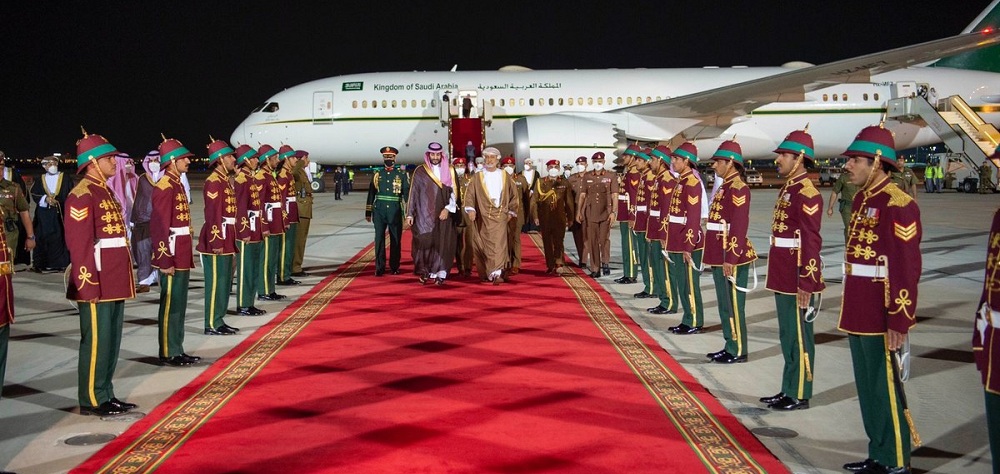Alwaght- As Persian Gulf region these days is scene to extensive diplomatic tours, Saudi Arabia's Crown Prince Mohammed bin Salman started a regional tour seeing him visit (Persian) Gulf Cooperation Council members.
The visit will take him to Oman, Bahrain, Qatar, the UAE, and Kuwait, reported Saudi and regional media.
The tour is preceding a (P) GCC annual meeting set for this month in Riyadh.
Bin Salman, who has set aside his noisy foreign trips for a long time amid damage to his image caused by Jamal Khashoggi assassination case, global criticism of the kingdom for war crimes in Yemen, worsening rights conditions, and fears of plots by his power rivals, is seeking various goals.
Yemen war still a Saudi foreign policy priority
Yemen war has long been the most important foreign policy issue for Saudi leaders. Now, with the complete collapse of the Saudi-led military coalition and sticking in war quagmire, increasing international pressure, and Riyadh's confusion over how to end the war in a dignified and less costly manner are challenges that have left the Saudis desperate. According to some diplomats familiar with his travel plan, during his tour, Prince Mohammed would seek more support and try to find a solution to the war, reported Bloomberg. With tightening of the Ma'rib encirclement by Yemeni forces and failure of Saudi airstrikes to check Ansarullah Movement's progress in west coast of Yemen, Riyadh is afraid that it could lose the battleground to Sana'a— where a revolutionary administration is governing— and thus go to potential peace talks with an empty hand and a lower position. Ansarullah responded to Saudi air raids with a new round of missile and drone attacks to create "deterrence."
In his tour, bin Salman would possibly seek role for Oman and Qatar for negotiations with Tehran and Sana'a as the two states have friendly ties with Iran. Muscat has hosted several rounds of direct and indirect Riyadh-Ansarullah talks so far.
Negotiations on Yemen would have another form during visit to the UAE. Gaps are increasingly emerging between the Saudi and Emirati plans in Yemen war, with the clashes between proxies of each side, namely Abdrabbuh Mansour Hadi and Southern Transitional Council (STC), bearing a proof. Bridging the gaps in Aden to unite their front in the face of the north would be a top job of bin Salman in talks with the Emiratis, amid news that an agreement to remove Mansour Hadi as a shortcut to a settlement is within sight.
Making consensus for Riyadh summit
As mentioned above, bin Salman's tour is taking place a few days before the annual meeting of the Cooperation Council member states, and he would carry official invitations from his father King Salman bin Abdulaziz. The Riyadh summit is important for Saudi Arabia for a set of reasons, and bin Salman is working to ensure agreement of other members with the objectives of the meeting in advance.
According to informed political sources, the visit is aimed at resolving geopolitical differences and strengthening cooperation and coordination between the six Persian Gulf Arab monarchies, especially in how to deal effectively with the world powers' nuclear talks with Iran and what is called as Iran's regional influence.
While relations among (P) GCC members are based on cultural, religious, and tribal ties, they have different foreign policy positions toward Iran. Oman, Kuwait and Qatar all have relatively good relations with the Islamic Republic. The UAE has also openly held de-escalation talks with Tehran in recent days in a bid to end years of political hill. This greatly undermines the Saudi efforts to create a consensus surrounding their painting of Iran as a threat. Riyadh needs such unified view to influence the nuclear negotiations process, justify its ambitious and covert nuclear program, continue large-scale arms purchases, and evade a real roadmap for a fast end to Yemen war.
Economic goals
Bin Salman knows that the ambitions to transform Saudi Arabia into a developed non-oil-dependent country in the region have been risky to his position and throne prospects as much as being effective in increasing his popularity at home and among the young generation. Saudi Arabia is working to attract multinational corporations as part of Prince Mohammed's Saudi Vision 2030 aimed at diversification of the kingdom's economy.
However, the staggering costs of continuing each day of the war in Yemen, along with the economic crisis caused by the coronavirus outbreak, the turbulent state of the oil market, and the mismatch of foreign investment with the goals set in the Vision 2030 document have left Saudi officials worried about falling behind the planning.
In the tour, Oman is a country to which Bin Salman has a special view regarding the benefits of increasing economic cooperation. Earlier this summer, Sultan Haitman bin Tariq of Oman made Saudi Arabia his first foreign destination since taking power last year, and during the trip various agreements were inked on future economic cooperation. Saudi Arabia has long dreamed of building an oil pipeline from its territory to the shores of the Sea of Oman. During the visit, a set of initiatives on investment, cooperation, and establishment of an industrial park in the Al-Daqm special economic zone were said to have been discussed with Muscat. Also, they are close to opening a 800-kilometer road connecting them via Empty Quarter, or Rub' Al-Khali in Arabic.
Attraction of Kuwaiti investments is also a set goal for bin Salman. Last month, the Kuwaiti Investment Authority, which manages the $700 billion "life-after-oil fund", said it planned to invest in green projects being set up by Saudi Arabia to reduce greenhouse gas emissions. In 2019, the fund invested around $1 billion in Saudi oil giant Aramco IPO.
The same thing is also true about Qatar. In January and after a reconciliation meeting in the Saudi city of Al-Ula, Qatari Foreign Minister Sheikh Mohammed bin Abdulrahman bin Jassim Al Thani said Qatar's investment fund can invest in Saudi Arabia and other Persian Gulf monarchies with tensions diffusion.



























